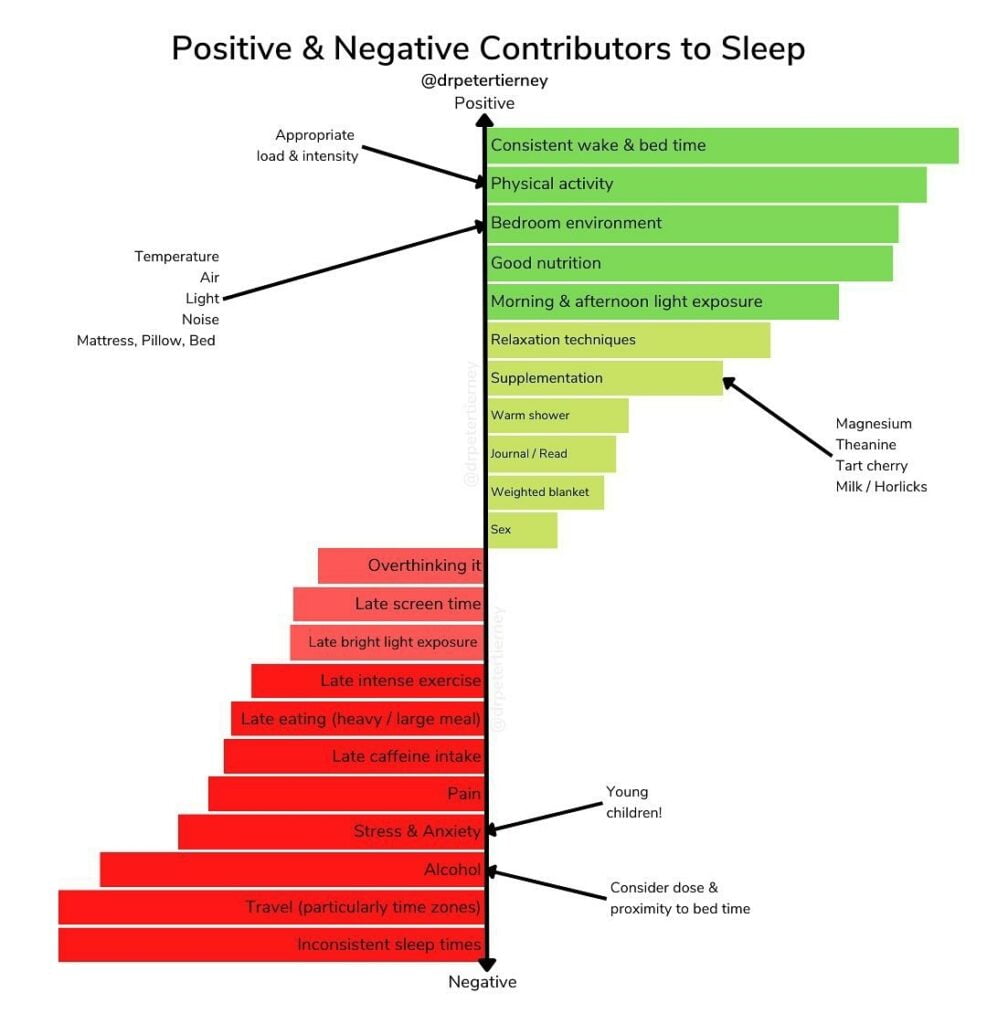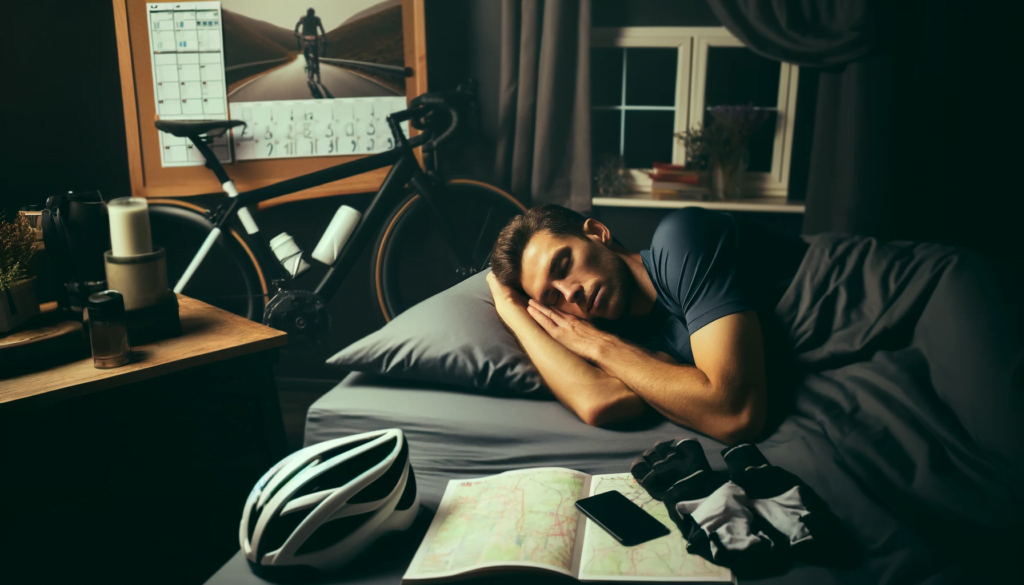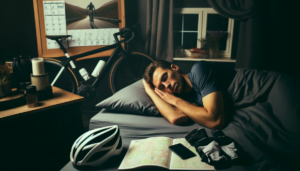Table of Contents
- Introduction
- Importance of Sleep for Athletic Performance
- Impact of Sleep on General Health
- Sleep Cycles and Their Impact on Performance
- Negative Health Consequences of Sleep Deprivation
- Performance Loss Due to Lack of Sleep
- Tips to Improve Sleep Quality and Quantity
- Conclusion
- Bibliography
Introduction
In the world of cycling, performance is intrinsically linked to multiple factors: training, nutrition, recovery, and perhaps one of the most underestimated, sleep. Cyclists often focus on mileage and the intensity of their workouts, overlooking the crucial importance of quality sleep hours. In this article, we will explore how improving the quality and quantity of sleep can benefit both your athletic performance and your health.
Importance of Sleep for Athletic Performance
Sleep is not just a period of rest; it is a vital physiological process that plays a fundamental role in muscle recovery, memory consolidation, hormonal regulation, and cellular repair. For cyclists who subject their bodies to extreme physical demands, optimal sleep quality and quantity are crucial for reaching peak performance.
Consequences of Sleep Deprivation on Performance
Sleep deprivation can significantly impact cycling performance. Resulting mental and physical fatigue can decrease concentration, increase reaction time, and reduce motor coordination, raising the risk of accidents during training or competition. Additionally, lack of sleep negatively affects the body’s ability to recover from physical exertion, leading to increased recovery time between training sessions, poorer performance in stage races, and greater susceptibility to injuries [1].
Benefits of Quality Sleep
Sufficient and good quality sleep can have positive effects on cycling performance. During deep sleep, the body releases growth hormones that aid in muscle repair and growth. Moreover, adequate sleep improves cognitive function, resulting in better decision-making and a greater ability to concentrate while cycling [2].
Impact of Sleep on General Health
Not only is athletic performance affected by sleep quality, but also the overall health of the cyclist. Chronic sleep deprivation has been associated with an increased risk of cardiovascular diseases, obesity, diabetes, and metabolic disorders. Prioritizing proper sleep not only enhances performance on the bike but also contributes to a healthier and longer life [3].
Sleep Cycles and Their Impact on Performance
Sleep is not a homogeneous state; it goes through different phases and cycles throughout the night. The sleep cycle mainly consists of two types of sleep: REM (Rapid Eye Movement) sleep and non-REM sleep, which is further divided into four stages. Throughout the night, the body goes through multiple sleep cycles, each with its own function and benefits for recovery and performance.
During the deep sleep phase, which generally occurs early in the night, the body experiences optimal muscle repair and recovery. This stage is crucial for tissue regeneration and physical recovery after intense exercise. On the other hand, the REM sleep phase, which occurs later in the night, is associated with memory consolidation and emotional processing.
It is important for cyclists to understand the importance of each sleep phase and how to optimize their sleep to make the most of these cycles. Maintaining a regular sleep schedule and prioritizing an adequate amount of sleep can help ensure the body goes through all the necessary sleep cycles for complete recovery and optimal performance on the bike. Additionally, strategic naps can complement nighttime sleep and improve daytime performance. Short naps of 20 to 30 minutes can provide an energy boost and enhance mental alertness without interfering with nighttime sleep [3], as long as they are not taken too close to bedtime; the ideal period is around 1-4 pm. The ideal duration is less than 30 minutes as this duration is less likely to cause sleep inertia, which is the grogginess you feel after waking up [4].
Negative Health Consequences of Sleep Deprivation
- Cardiovascular Diseases: Sleeping less than six hours a night significantly increases the risk of developing coronary heart disease and high blood pressure.
- Obesity and Diabetes: Lack of sleep is associated with a higher risk of obesity and type 2 diabetes due to changes in the levels of appetite-regulating hormones and blood glucose.
- Weakened Immune System: Sleep deprivation can suppress the body’s immune response, increasing the risk of infections and illnesses.
- Mental Health: Lack of sleep can increase the risk of developing mood disorders such as depression and anxiety [6].
Performance Loss Due to Lack of Sleep
- Reaction Time: Lack of sleep can increase reaction time in activities that require coordination and precision, such as cycling. Just one night of sleep deprivation can result in up to a 20% increase in reaction time, higher for more complex tasks and lower for simpler tasks [5].
- Physical Performance: Fatigue caused by lack of sleep can reduce the body’s ability to perform at its best during exercise. Sleep deprivation can decrease physical performance in different types of activities (strength, endurance, speed, skill) by 3-12% [1].
- Cognitive Ability: Cycling requires constant attention and concentration. Lack of sleep can negatively affect cognitive function, resulting in a notable decrease in the ability to make quick and accurate decisions [2].
Tips to Improve Sleep Quality and Quantity
- Establish a Sleep Routine: Going to bed and waking up at the same time every day helps regulate the body’s internal clock, including on weekends.
- Create a Sleep-Conducive Environment: Keeping the room dark, cool, and quiet can improve sleep quality.
- Limit Screen Exposure Before Bed: The blue light emitted by electronic devices can interfere with the production of melatonin, the sleep hormone, thus increasing sleep latency (the time it takes to fall asleep). It is important to eliminate screen exposure entirely 1 hour before bedtime.
- Exposure to Morning Sunlight: Morning sunlight exposure has multiple benefits for regulating circadian rhythms and improving sleep quality at night. Receiving natural light at the start of the day helps adjust the body’s internal clock, which is crucial for sleep quality and overall health. This process helps suppress residual melatonin, the sleep-inducing hormone, promoting alertness during the day and facilitating melatonin production at night, improving the ability to fall asleep and stay asleep. Additionally, morning sunlight exposure triggers a healthy increase in cortisol levels, promoting wakefulness and supporting the immune system and metabolism. According to Andrew Huberman, the recommendation for morning sunlight exposure is 2 to 10 minutes for most people, and 10 to 20 minutes if it is cloudy or living at a high latitude [7].
- Avoid Stimulants Before Bed: Caffeine and other stimulants can make it difficult to fall asleep, considering that the half-life of caffeine (the time it takes for the body to eliminate half of the ingested caffeine) can be up to 5 hours. It is recommended to leave at least 8 hours between the last caffeine intake (ideally small, such as black tea or better yet, green or white tea) and bedtime.
- Intake Before Bedtime: Eat 2-3 hours before sleeping and limit water intake an hour before bed.
- Regular Exercise: Exercising daily will make you more tired by the end of the day and easier to fall asleep. However, keep in mind that training right before bedtime, especially if it is high-intensity training, will not be the best option as it activates the sympathetic nervous system, which is the opposite of what is desired in the last hours of the day.
In summary, and considering the importance of each factor in improving sleep latency and quality, Dr. Peter Tierney has created this chart, which we can use to set priorities and identify which details we can refine to improve our sleep quality. Therefore, by following the five most important factors and avoiding the most harmful ones, we would practically have an optimal sleep routine.

Dr. Peter Tierney also uses the 10-3-2-1 rule. This refers to the hours that should pass before going to sleep for: consuming caffeine (10 hours), eating (3 hours), working (2 hours), and looking at screens (1 hour) [8]. A simple mnemonic rule that can be useful for remembering the ideal timings.
Conclusion
In summary, improving sleep quality and quantity is essential to maximizing athletic performance and maintaining good general health. Cyclists should consider sleep as an integral part of their training regimen and adopt habits that promote restorative sleep. By prioritizing adequate rest, cyclists can reach new performance levels on the bike and enjoy a healthier and more balanced life. Following the Pareto principle, which states that 20% of our actions generate 80% of the results, in the case of recovery, we will achieve 80% of the results by improving the quantity and quality of our sleep and eating a varied, quality, and sufficient diet. Once we have optimized this, we can then consider other additional recovery options.
Bibliography
[1] Craven, J. et al. (2022). Effects of Acute Sleep Loss on Physical Performance: A Systematic and Meta-Analytical Review. Sports Medicine.
[2] Cook, J. and Charest, J. (2023). Sleep and Performance in Professional Athletes. Current Sleep Medicine Reports.
[3] Cunha, L. et al. (2023). The Impact of Sleep Interventions on Athletic Performance: A Systematic Review. Sports Medicine – Open.
[4] Milner, C. and Cote, K. (2009). Benefits of napping in healthy adults: impact of nap length, time of day, age, and experience with napping. Journal of Sleep Research.
[5] Xu, L. et al. (2022). Acute Sleep Deprivation Impairs Motor Inhibition in Table Tennis Athletes: An ERP Study. Brain Science.
[6] Carskadon, M. (2004). Sleep deprivation: health consequences and societal impact. The Medical clinics of North America.
[7] Huberman, A. (2022). Why is morning sunlight important? https://ai.hubermanlab.com/s/Ns8bG2uQ
[8] Tierney, P. (2024). 10-3-2-1 Sleep “Formula”. https://www.instagram.com/p/C39JKpbL-KM/?igsh=ZHM1dTFmMm9yc2Fk



